
How did Switzerland become Switzerland? When and how was it founded? Did you know that the only war in Switzerland, which has been neutral throughout its history and has not participated in any war, was a civil war? Despite being so centrally located in the heart of Europe, how did it remain neutral throughout both the World Wars and the Cold War?
Let’s have a look at the history of Switzerland, which has no problem with anyone but itself! In this brief history of Switzerland article, I will be sharing the short history of Switzerland from prehistoric to nowadays. I promise you won’t be bored even if you are not interested in history! 🙂
Brief History of Switzerland – Prehistory
We’ve gone pretty back, but it may be of interest to those who are interested in prehistoric times. Archaeological evidence has been found that in the northern part of the Alps in Switzerland, during the Paleolithic period, hunter-gatherers settled in this region 150,000 years ago. Until the Neolithic period, the population in this region was quite dense.
But the oldest remains is a hand axe that was shaped by Homo Eractus 300,000 years ago. Celtic tribes settled in the region around 1500 BC. While the Reatians settled in the East region, the west side was occupied by the Helvetians.
Brief History of Switzerland – Roman Empire Time

In 58 BC, when the Helvetians took the road to settle in Gaul to escape from the pressure of nomadic Germanic tribes, they were stopped, defeated and their lands were occupied by Julius Caesar’s armies. Over time, the Alpine people in these regions were integrated into the Roman Empire. Then the region was thoroughly romanized for the following centuries.
The region started to become Christian in the 3rd and 4th centuries. However, the Roman Empire collapsed when the Germanic tribes entered the region in 476 AD. While the Burgundians, one of the Germanic tribes, settled in the west, the Alamanians settled in the north. They forced the Celtic-Roman population living here to slowly retreat to the mountains.
Later, the region was ruled for a long time by another Germanic tribe, the Franks’ Caroling Dynasty. Then it was changed hands several times by different dukes and kings. Imagine how many Game of Thrones was filmed in the country.
Brief History of Switzerland – Medieval period
On 1 August of 1291, representatives of three forest cantons (Uri, Schwyz and Unterwalden) signed the Federal Declaration, which is accepted as the founding document of Switzerland. Today, August 1 is celebrated as a national holiday.
Today, August 1 is celebrated as a national holiday.

In 1353, in addition to these three forest cantons that united for the first time, the cantons of Glarus and Zug and the city-states of Lucerne, Zurich, and Bern joined the union, and the “Old Federation” consisting of eight states was established.
Meanwhile, Zurich was expelled from the confederation in 1440 due to a territorial dispute but was later taken back. Later on, other cantons started to join the federation one by one. The independence of Switzerland, which was a state under the Holy Roman Empire until 1648, was recognized by the European countries with the Westphalian Peace Treaty.
As additional information, the Swiss soldiers were so disciplined and successful that the Pope of the Roman Catholic Church of the time II. Julius hired Swiss soldiers as guards to protect the Vatican. The Swiss soldiers are still responsible for protecting the Vatican.
Brief History of Switzerland – French Invasion
The French Revolution armies occupied Switzerland in 1798. They enforced a new constitution that forcibly centralized the government of the country and abolished the cantons. The Helvetian Republic was established in this region. The Swiss people revolted frequently, but unfortunately, due to the presence of French troops, the riots didn’t succeed.
Switzerland was later invaded by other states such as Austria and Russia. However, not everyone in Switzerland wanted to go back to the old cantonal times, as Switzerland was divided between “Republicans” who supported the central government and “Federalists” who wanted the cantons to regain autonomy.
At that time, Napoleon Bonaparte enacted the Mediation Act, bringing both sides together in Paris in 1803, which largely restored Switzerland’s autonomy.
In the year 1815, the Vienna Congress and the independence and neutrality of Switzerland were recognized by all European powers. At that time, Switzerland made its last expansion in history, with the cantons of Valais, Neuchatel and Geneva joining the federation.
Brief History of Switzerland – The Swiss Civil War and the Swiss Federal Constitution of 1848
When the year shows 1845, Switzerland has experienced one of the most important civil wars in its history. What’s the reason? I am Protestant, you are Catholic, how do we get along?
7 Catholic cantons gathered and formed a union called Sonderbund. (One of these cantons is Zug, the canton where I work. They are still very religious that religious holidays are more than most other cantons. For example, a day when my husband working in Zurich has to go to work (they don’t count it as a religious holiday because Zurich is Protestant), I am on holiday because it is a religious holiday in Zug, who is a Catholic).
Anyway, the Protestants who heard that the Catholics founded Sonderbund, immediately declared war. This civil war lasted 27 days, with nearly 100 casualties, and this civil war went down in history as the last armed conflict in Swiss history.

The Federal Constitution was adopted after the civil war in 1848 and the referendum was implemented. With this constitution, a central authority was established and it was decided that the cantons would govern themselves in local matters. However, after the industrial revolution, many changes were made to the constitution and the cantons were given more control over local matters.

Brief History of Switzerland – Switzerland During World Wars
Switzerland took a side neither in the 1st World War nor the 2nd World War and did not participate in both wars. Only during World War II, Germany said that they would attack Switzerland, but such an attack never happened. During World War II, Switzerland was used as a base for espionage and often mediated communication between the two sides.
During World War II, Switzerland was used as a base for espionage and often mediated communication between the two sides.
Since the Swiss franc was the only major currency in the world that can be freely converted during World War II, all countries started to sell large amounts of gold to the Swiss National Bank.
Unfortunately, hundreds of millions of francs of this gold were plundered from the central banks of the occupied countries. Only the gold, stolen from the victims of the genocide and sold to Swiss banks, amounted to 581,000 francs.
Brief History of Switzerland – Modern Switzerland
As we know, Switzerland is not a member of the European Union. In fact, they applied to the European Union in 1992. But when the people refused to enter the EEA in the referendum, they did not make any attempt to enter the European Union again.
However Swiss law is in line with EU laws and Switzerland has many agreements with the European Union. Switzerland, which is not a member of the European Union, has joined the Schengen agreement because it was asked to the public by referendum and accepted with a 55% vote.
Then this song is from me to all of us: Einer für alle, alle für einennn!
Don’t forget to check out my article which includes interesting information about Switzerland. If you want to learn about traveling in Switzerland, you can visit here and about living in Switzerland check here!
What do you think about Switzerland? Let’s meet in the comments!
